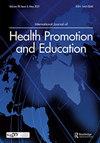从反思日志中学习;领航员在协助病人获得社区卫生和社会资源方面的经验
IF 0.7
Q3 EDUCATION, SCIENTIFIC DISCIPLINES
International Journal of Health Promotion and Education
Pub Date : 2022-05-10
DOI:10.1080/14635240.2022.2073900
引用次数: 0
摘要
我们开发并实施了一个以人为中心的导航模型,整合到初级保健中,患者由其初级保健提供者(PCP)转介到社区资源获取(ARC)研究中。本文的目的是探讨外行导航员的学习经验,反映在他们的期刊和目前的教育和健康促进实践的启示。研究人员分析了两名航海家的66篇日志。为了对数据进行编码,我们使用了一种基于理论指导的外行导航员培训计划的新开发框架。确定了五个独特的主题:1)获得和建立信任,2)发展同理心,3)体验希望和乐观,4)感受无助,5)庆祝收获和成功。确定的五个主题依次描绘了主要个人从初级保健到卫生和社会社区资源的历程。这种创新的方法扩大了我们对导航员如何在实践中学习的理解,更具体地说,他们如何向患者学习,以及他们如何在以人为本的护理中发展知识和技能。将反思日志作为一种常规练习,可以提供情境感知能力,并促进学习。当建立信任和共情关系时,实践以人为本的护理也会得到发展。本文章由计算机程序翻译,如有差异,请以英文原文为准。
Learning from reflective journaling; the experience of navigators in assisting patients access to health and social resources in the community
ABSTRACT We developed and implemented a person-centered navigation model integrated in primary care where patients were referred to the Access to Resources in the Community (ARC) study by their primary care provider (PCP). The purpose of this paper is to explore the lay navigators’ learning experience as reflected in their journals and present implications for education and health promotion practice. Sixty-six journal entries from two navigators were analysed. To code the data, we used a newly developed framework based upon the theory-informed lay navigator training programme. Five unique themes were identified: 1) Gaining and Building Trust, 2) Developing Empathy, 3) Experiencing Hope and Optimism, 4) Feeling Helplessness and 5) Celebrating Gains and Successes. The five themes identified paint a sequential picture of the journey of leading individuals from primary care to health and social community resources. This innovative approach has expanded our understanding of how navigators learn in practice, more specifically how they learn from patients and how they develop knowledge and skills in person-centered care. Incorporating reflective journaling as a regular practice provides situational awareness and leads to enhanced learning. Practising person-centered care also develops when a trusting and empathetic relationship is established.
求助全文
通过发布文献求助,成功后即可免费获取论文全文。
去求助
来源期刊

International Journal of Health Promotion and Education
EDUCATION, SCIENTIFIC DISCIPLINES-
CiteScore
2.30
自引率
10.00%
发文量
69
 求助内容:
求助内容: 应助结果提醒方式:
应助结果提醒方式:


